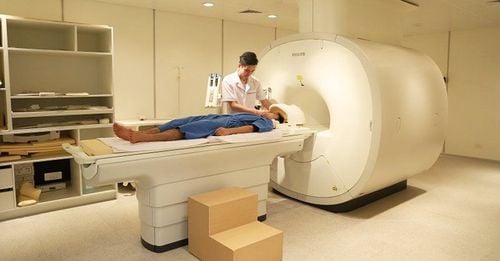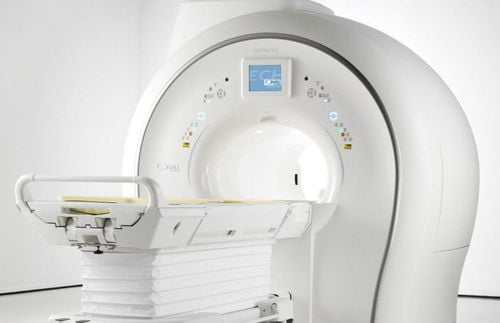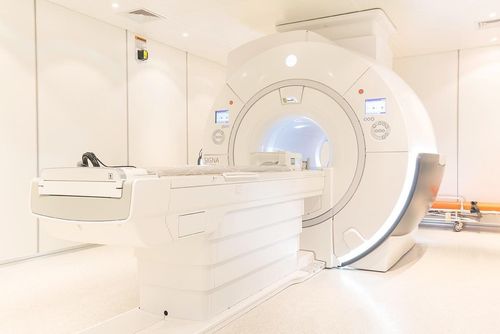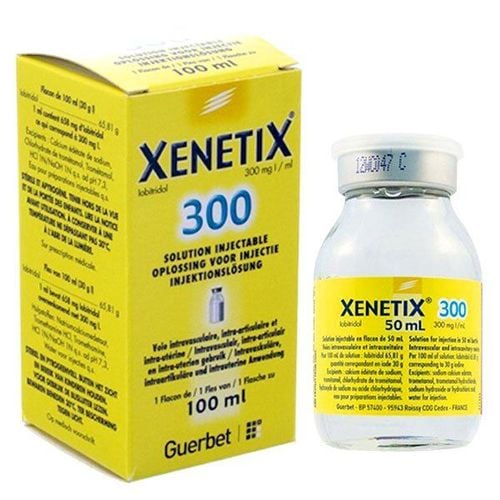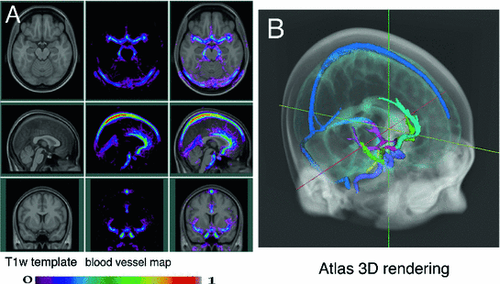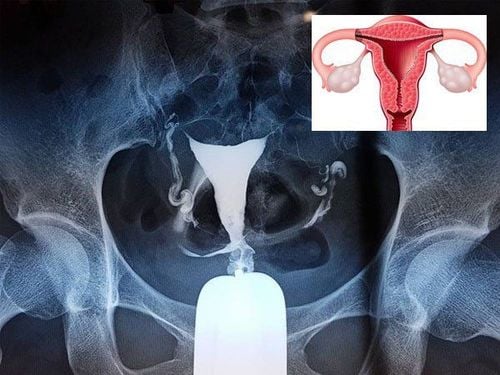This is an automatically translated article.
The article is professionally consulted by Master, Doctor Nguyen Thanh Nam - Radiologist - Department of Diagnostic Imaging - Vinmec Danang International General Hospital.Magnetic resonance imaging (MRI) is a significant advance in medical imaging. This effective, safe and accurate diagnostic method is currently the top priority for specialists to assign to patients in complex pathologies. In order for Magnetic Resonance Imaging (MRI) to give the most accurate and clear images, patients need certain preparations.
1. Is magnetic resonance imaging (MRI) necessary?
Magnetic resonance imaging (MRI) uses a strong magnetic field (Bo) and a pulsed radio frequency system to control the electromagnetic activity of the hydrogen atom's nucleus. Here, the hydrogen atom nuclei (which are abundant in water of body tissues) under the influence of radio waves and the Bo magnetic field radiated energy in the form of radio frequency signals. These signals will be received and processed by the receiver system to create image data.The outstanding advantage of MRI technique is that it does not use radiation, does not cause radiation, so it is very safe for patients, the new generation MRI machine does not make noise, so it feels comfortable and comfortable. In addition, MRI diagnostic images have good resolution, multi-pulse, multi-plane, 3D reconstruction, ... applicable to most body parts
Currently, with the above advantages , magnetic resonance imaging (MRI) is widely applied in early detection, diagnosis and monitoring of many body diseases such as: spinal neuropathy; craniocervical diseases, musculoskeletal diseases, tumors of intra-abdominal organs such as liver, biliary tract, kidney, adrenal gland, pancreas, gastrointestinal tract, uterus and ovaries; breast cancer; Cardiovascular disease (cardiac and vascular magnetic resonance), congenital abnormalities in the fetus (fetal MRI), tumor screening, systemic metastases...
Painless magnetic resonance imaging (MRI) method painful, the shooting time lasts about 12 -45 minutes. The doctor can then read the exact results and give you your current medical or health condition, from which to have the right treatment and advice.
2. Does magnetic resonance imaging (MRI) require fasting?
Basically, there is no need for fasting without injecting magnetic resonance imaging. Commonly encountered in screening for cranial-cerebral-vascular abnormalities, disc herniation or common musculoskeletal diseases. When contrast is required, clients are advised to fast or snack for 4 hours prior to injection. Cases must use magnetic contrast as in tumor pathology.
Hầu hết trường hợp Chụp cộng hưởng từ (MRI) không cần nhịn ăn
When anesthesia is required, they must fast for 4-6 hours before the scan. When you need to inject contrast, you need to fast before 4-6 hours
3. Some things to know when preparing for an MRI
During an MRI scan, you will lie inside a large magnetic tube, which will create a very strong magnetic field. Therefore, you only perform this imaging method when prescribed by your doctor. When taking pictures, you lie still, do not move, wait for the machine to work to get the most effective and quality diagnostic images.Before taking and diagnosing the disease, you should bring along the test results, ultrasound, X-ray and CT films (if any) for your doctor's reference and decision on the appropriate imaging technique for each patient. physical.
When the room staff receives you into the imaging room, you will be instructed to complete the safe procedure for magnetic resonance, change into hospital clothes, remove magnetic items such as dentures, jewelry such as rings, necklaces, earrings, watches, credit cards, ATM cards, magnetic keys...
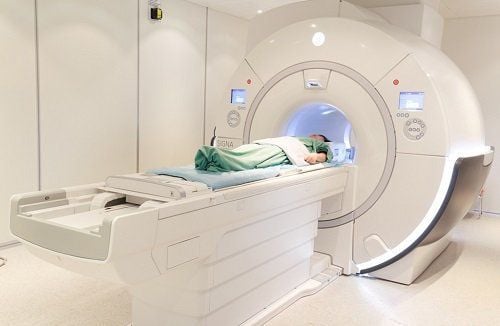
Bệnh nhân cần tháo các vật dụng từ, kim loại trước khi chụp MRI
You need to inform the technical staff if you have any tools or equipment in your body such as: Artificial Heart Valves, Vascular Stents, IUDs, Defibrillators, Artificial Pacemakers, Assistive Devices hearing, Automatic drug injection device...
In case of injection of contrast agent, medical staff will ask about history of drug allergy, allergic symptoms after injection may occur such as: Sadness vomiting, rash... Contrast drugs are rarely toxic to the body. If hepatobiliary imaging or anaesthesia, the patient should be sure to fast for 4-6 hours prior to the scan.
Usually, the duration of an MRI scan varies from 10 minutes to 45 minutes depending on the organ to be examined, the patient's cooperation (remaining still) and whether the patient is receiving contrast injection. In the imaging room, the technician will carefully guide the patient to lie on the table in the most suitable position so that you can lie still during the scan.
When taking pictures, the patient will hear noise from the machine due to the phenomenon of magnetic resonance, this is normal. You may be wearing headphones to reduce noise.
Depending on the body part taken, the technician may have other requirements such as: Do not swallow when taking cervical spine, ask to hold your breath for a short time when taking abdomen and chest to get a better picture.
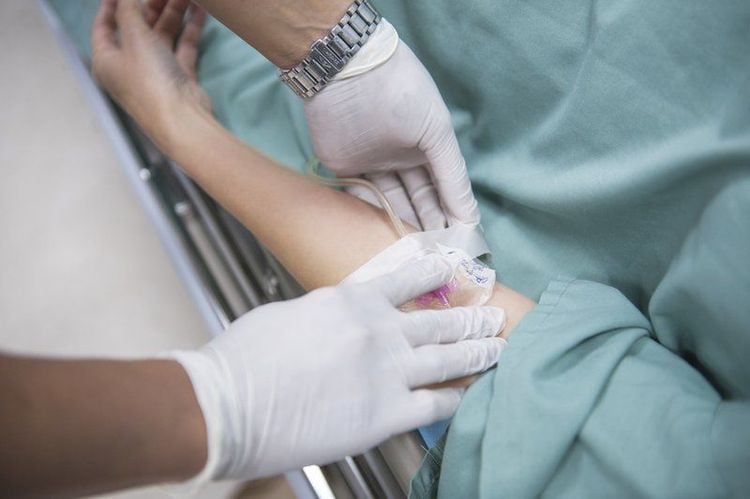
Chụp MRI có thể cần tiêm thuốc tương phản
When injecting the drug, the patient may feel the whole body warm or have a bitter taste in the tongue, this is normal , the symptoms will go away on their own within 2 - 5 minutes. Film and results table after MRI will be available as soon as 15 to 30 minutes, if need to be calibrated, the waiting time may be longer than a few hours.
Thus, in most cases of MRI, the patient does not need to fast, unless contrast injection, anesthesia or hepatobiliary imaging are required. If you have questions about problems before and during an MRI, ask your doctor and technical staff directly.
Currently, Vinmec International General Hospital has put into use a 3.0 Tesla magnetic resonance imaging machine with Silent technology (no noise) to help diagnose diseases more accurately and make you more comfortable when taking pictures.
Silent technology is especially beneficial for patients who are children, the elderly, weak health patients and patients undergoing surgery. Limiting noise, creating comfort and reducing stress for customers during the shooting process, helping to capture better quality images and shorten the shooting time. MORE:
What are the benefits of Magnetic Resonance Imaging (MRI)? What is the effect of magnetic resonance imaging (MRI) of the brain? For the first time in Southeast Asia, Vinmec uses a magnetic resonance imaging machine with Silent technology





